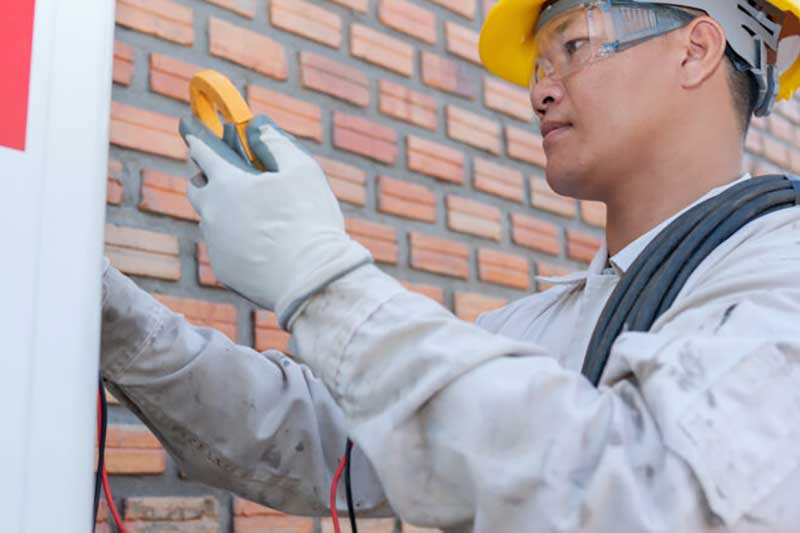We will always need HVAC technicians. Especially during the cold winters and hot summers. Are you interested in becoming an HVAC technician?
Heating, ventilation, and air conditioning technicians perform critical work every day that keeps homes, businesses, and essential facilities operational. The best part is with the right training anyone can become an HVAC technician. Starting your career requires some research and time to commit to a program.
Did you know that you can become an HVAC technician in less than a year at an accredited trade school? An HVAC diploma program can train you to start working, enter an apprenticeship and be on your way to earning your license as a certified HVAC technician. Here is what you need to know about choosing a program and beginning your next career move.
Do You Need a License to Be an HVAC Technician?
California requires all HVAC technicians to hold a valid state HVAC license. You must also pass the EPA 608 universal certification exam. Both of these credentials ensure that all HVAC technicians operating in the state are fully qualified and up to date in the latest safety and environmental regulations.
Earning both credentials require passing individual exams. Preparing for them might seem difficult on your own, but trade school offers professional guidance every step of the way.
How Do You Prepare for the HVAC License Exam?
The easiest way to become an HVAC technician is to enroll in a trade school program. The HVAC technician program prepares you in as little as 10 months, attending full-time. Alternatively, you can start as an HVAC apprentice and work for several years before you qualify for the licensing exam.
Students who start their career through trade school can secure HVAC technician jobs in California much faster; without having any formal education behind them, an individual would have to work as an HVAC journeyman for at least four years before they qualify to sit for the C20 license exam.
What Are the Benefits of an HVAC Technician Diploma Program?
The greatest benefit of attending an HVAC technician diploma program is the in-depth education you receive. On-the-job training will vary by employer, and it may take months or years before you encounter certain material. The curriculum in our HVAC program is structured to guide you through the complete HVAC curriculum. You start with the absolute basics, then work your way through a variety of skills workshops and classroom exercises to gain the knowledge and abilities required to succeed in the workforce.
Become HVAC-Ready in 11 Months
Full-time students can earn their HVAC technician diplomas in as little as 11 months. This means within a year, you can go from not having knowledge of HVAC to a qualified, employable professional. After earning your license and EPA 608 certification, you can work as a contractor for any business or even start your own.
A Detailed Curriculum Designed to Meet Modern Consumers’ Needs
Our program is built around jobs, not theories. With that in mind, we have developed a comprehensive HVAC program that teaches you the skills and knowledge you need to be job ready. You will begin your educational journey by learning the fundamentals of HVAC. Heating, ventilation, and air conditioner systems range from relatively small residential units to massive industrial-sized units that ventilate factories and warehouses.
Throughout your training, you’ll have a combination of classroom instruction and skill-driven exercises to gauge your progress. Industry experienced instructors lead you through the curriculum, so you will always have access to expert knowledge and guidance.
In addition to learning how heating, ventilation, and air conditioning work, you will also learn about the principles of refrigeration. As you can see the professional title listed as HVAC/R in recent years. Knowing how to safely work with refrigerants is also crucial to passing the EPA 608 universal certification exam.
Hands-on Exercises to Master Diagnostics and Repair
From a frozen condenser coil to a broken fan motor, you learn how to identify and quickly remedy common HVAC problems. You get hands-on instruction with real HVAC equipment, including a variety of makes and models you are likely to encounter on the job.
Our goal is to teach you everything you need to feel confident working as an HVAC professional in the real world. The materials, tools, and equipment we use are all exactly what you will work with in your daily job.
The greatest advantage of attending a trade school program is that you learn everything systematically. Each lesson builds on the last and by the end of the program you have a complete understanding of HVAC and all that it entails. If you skip trade school and go the apprentice route, you are not guaranteed to learn anything in a particular order. This can lead to knowledge and skill gaps that are difficult to close on your own, and it may deter your progress in earning a license.
Instructors With Skill and Passion
A trade school is only as good as its instructors; that is why we have taken great lengths to hire only the best in the field. Our HVAC instructors have years of experience working in the industry. They have been contractors themselves, and understand what students really need to find jobs, succeed, and get the most out of their careers.
You will always have access to a wealth of professional knowledge. Instructors are always eager to answer questions and offer one-on-one support to students who need it. A small class ratio ensures there is enough time for each student to get the guidance they need.
You will also be surrounded by a class of dedicated students just like you. We welcome students from all walks of life to pursue their dreams and reach their career ambitions. This puts you in a great position to connect with others interested in HVAC and even build a professional network.
Learn From Your Mistakes
As an apprentice, your mistakes on the job can have serious consequences. Failing to make a repair costs the company you work for time and money. These wages may even be deducted from your pay if you are the cause of the problem. In trade school, mistakes are a natural part of learning, and you learn from your mistakes.
Budding HVAC technicians learn through trial and error. As you work on real HVAC machinery, you will have plenty of time to explore. Rather than solely learning how to pinpoint specific problems, you will get to learn a system inside and out.
As a graduate of the HVAC diploma program, you will be comfortable with many different types of HVAC systems. You will know how to easily identify potential sources of trouble, make installations, and replace hardware.
On-the-Job Training with a Professional Externship
While the classroom and HVAC lab exercises give you plenty of time to sharpen your skills, nothing prepares you more than performing real HVAC repair jobs. All HVAC technician students participate in an externship. You are sent to work under the supervision of a real HVAC professional, assist them in their jobs and gain valuable professional experience. The ability to learn on-the-job prepares you for the future; you also get to add relevant experience to your growing resume that will help you get hired after graduation.
Access to Career Services
HVAC technician jobs are available in California, but you still may need help finding the right position for you. Luckily, our dedicated career services staff is here to help. We work with you on an individual basis to craft your resume, prepare for job interviews and find potential jobs that align with your skills, preferences, and career objectives.
A trade school doesn’t exist only to teach; our ultimate goal is to help emerging professionals develop their skills and launch themselves into fulfilling careers. You can reach out to us anytime for ongoing support, even after you complete your program.
Certification Preparedness
Test your knowledge and build confidence with C20 license and EPA 608 practice exams. The curriculum throughout your studies helps tackle the major questions and subject material, but there are also dedicated courses designed to help you prepare for your exams.
Throughout training, you will develop a strong understanding of core HVAC principles, safety and environmental regulations and repair protocol. At the end of your program, you will be a confident professional that will not only have the confidence to take the licensing exam, but also thrive in the workplace.
How to Become an HVAC Technician in CA
You can start your journey into HVAC now. Our program is actively accepting new students, and we are happy to walk you through the easy enrollment process. Whether you have just graduated high school, work as an apprentice or want a career change, our HVAC program welcomes you.
HVAC Technician Diploma
The HVAC Technician II program has been designed to prepare graduates for entry-level positions as a Heating, Air Conditioning, and Refrigeration Mechanic and/or Installer through relevant classroom knowledge and hands-on technical skills. Learn in small classrooms or hybrid! Gain hands-on experience and college credits with local employers during a five-week practical externship.
Contact us today to learn more about HVAC technician career opportunities offered at ATA College.





